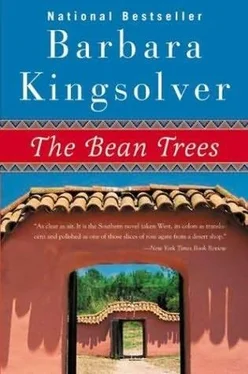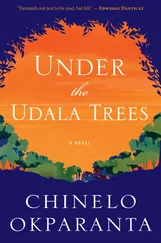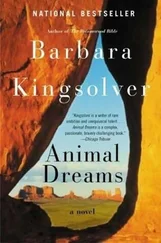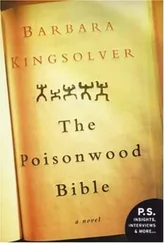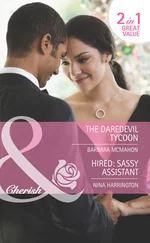“He’s only half owner, with Ernest Jakes,” I said. “It’s not like the whole shop belongs to him.”
“Alice and Harland sittin’ in a tree,” she sang, “K-I-S-S-I-N-G!”
I plugged my ears and sang, “I’m going back someday! Come what may! To Blue Bayou!” Turtle whacked the dirt and sang a recipe for succotash.
I spotted Mrs. Parsons and Edna Poppy coming down the gravel path with their arms linked. From a great distance you could have taken them for some wacked-out geriatric couple marching down the aisle in someone’s sick idea of a garden wedding. We waved our arms at them, and Turtle looked up and waved at us.
“No, we’re waving at them,” I said, and pointed. She turned and folded and unfolded her hand in the right direction.
Now and again these days, not just in emergencies, we were leaving the kids with Edna and Virgie Mae on their front porch to be looked after. Edna was so sweet we just hoped she would cancel out Virgie’s sour, like the honey and vinegar in my famous Chinese recipe. It was awfully convenient, anyway, and Turtle seemed to like them okay. She called them Poppy and Parsnip. She knew the names of more vegetables than many a greengrocer, I’d bet. Her favorite book was a Burpee’s catalogue from Mattie’s, which was now required reading every night before she would go to bed. The plot got old, in my opinion, but she was crazy about all the characters.
“Ma Poppy,” Turtle said when they were a little closer. She called every woman Ma something. Lou Ann was Ma Wooahn, which Lou Ann said sounded like something you’d eat with chopsticks, and I was just Ma. We never told her these names, she just came to them on her own.
The two women were still moving toward us at an unbelievably slow pace. I thought of a game we used to play in school at the end of recess: See who can get there last. Edna had on a red knit top, red plaid Bermuda shorts, and red ladies’ sneakers with rope soles. Virgie had on a tutti-frutti hat and a black dress printed all over with what looked like pills. I wondered if there was an actual place where you could buy dresses like that, or if after hanging in your closet for fifty years, regular ones would somehow just transform.
“Good afternoon, Lou Ann, Taylor, children,” Mrs. Parsons said, nodding to each one of us. She was so formal it made you want to say something obscene. I thought of Lou Ann’s compulsions in church.
“Howdy do,” Lou Ann said, and waved at a bench. “Have a sit.” But Mrs. Parsons said no thank you, that they were just out for their constitutional.
“I see you’re wearing my favorite color today, Edna,” I said. This was a joke. I’d never seen her in anything else. When she said red was her color, she meant it in a way most people don’t.
“Oh, yes, always.” She laughed. “Do you know, I started to dress in red when I was sixteen. I decided that if I was to be a Poppy, then a Poppy I would be.”
Edna said the most surprising things. She didn’t exactly look at you when she spoke, but instead stared above you as though there might be something wonderful hanging just over your head.
“Well, we’ve heard all about that before, haven’t we?” said Mrs. Parsons, clamping Edna’s elbow in a knucklebone vice-grip. “We’ll be going along. If I stand still too long my knees are inclined to give out.” They started to move away, but then Mrs. Parsons stopped, made a little nod, and turned around. “Lou Ann, someone was looking for you this morning. Your husband, or whatever he may be.”
“You mean Angel?” She jumped so hard she bumped the stroller and woke up Dwayne Ray, who started howling.
“I wouldn’t know,” Virgie said, in such a way that she might as well have said, “How many husbands do you have?”
“When, this morning while I was at the laundromat?”
“I have no idea where you were, my dear, only that he was here .”
“What did he say?”
“He said he would come back later.”
Lou Ann bounced the baby until he stopped crying. “Shit,” she said, quite a few minutes later when they’d moved out of earshot. “What do you think that means?”
“Maybe he wanted to deliver a check in person. Maybe he wants to go on a second honeymoon.”
“Sure,” she said, looking off at the far side of the park. She was still jiggling Dwayne Ray, possibly hadn’t noticed he’d stopped crying.
“Why do you think she puts up with that coot?” I asked.
“What coot, old Vicious Virgie you mean? Oh, she’s harmless.” Lou Ann settled the baby back into his stroller. “She reminds me of Granny Logan. She’s that type. One time Granny introduced me to some cousins by marriage of hers, I was wearing this brand-new midi-skirt I’d just made? And she says, ‘This is my granddaughter Lou Ann. She isn’t bowlegged, it’s just her skirt makes her look that way.’ ”
“Oh, Lou Ann, you poor thing.”
She frowned and brushed at some freckles on her shoulder, as though they might suddenly have decided to come loose. “I read a thing in the paper this morning about the sun giving you skin cancer,” she said. “What does it look like in the early stages, do you know?”
“No. But I don’t think you get it from sitting out one afternoon.”
She pushed the stroller back and forth in an absent-minded way, digging a matched set of ruts into the dust. “Come to think of it, though, I guess that’s a little different from the way Mrs. Parsons is. Somehow it’s more excusable to be mean to your own relatives.”
She rubbed her neck and turned her face to the sun again. Lou Ann’s face was small and rounded in a pretty way, like an egg sunny side up. But in my mind’s eye I could plainly see her dashing out the door on any given day, stopping to say to the mirror: “Ugly as homemade sin in the heat of summer.” No doubt she could see Granny Logan in there too, staring over her shoulder.
After a while I said, “Lou Ann, I have to know something for Turtle’s and my sake, so tell me the honest truth. If Angel wanted to come back, I mean move back in and have everything the way it was before, would you say yes?”
She looked at me, surprised. “Well, what else could I do? He’s my husband, isn’t he?”
There may have been a world of things I didn’t understand, but I knew when rudeness passed between one human being and another. The things Mrs. Parsons had said about aliens were wrong and unkind, and I still felt bad even though weeks had passed. Eventually I apologized to Estevan. “She’s got a mean streak in her,” I told him. “If you’re unlucky enough to get ahold of a dog like that, you give it away to somebody with a big farm. I don’t know what you do about a neighbor.”
Estevan shrugged. “I understand,” he said.
“Really, I don’t think she knew what she was saying, about how the woman and kid who got shot must have been drug dealers or whatever.”
“Oh, I believe she did. This is how Americans think.” He was looking at me in a thoughtful way. “You believe that if something terrible happens to someone, they must have deserved it.”
I wanted to tell him this wasn’t so, but I couldn’t. “I guess you’re right,” I said. “I guess it makes us feel safe.”
Estevan left Mattie’s every day around four o’clock to go to work. Often he would come down a little early and we’d chat while he waited for his bus. “Attending my autobus” was the way he put it.
“Can I tell you something?” I said. “I think you talk so beautifully. Ever since I met you I’ve been reading the dictionary at night and trying to work words like constellation and scenario into the conversation.”
He laughed. Everything about him, even his teeth, were so perfect they could have come from a book about the human body. “I have always thought you had a wonderful way with words,” he said. “You don’t need to go fishing for big words in the dictionary. You are poetic, mi’ija.”
Читать дальше
